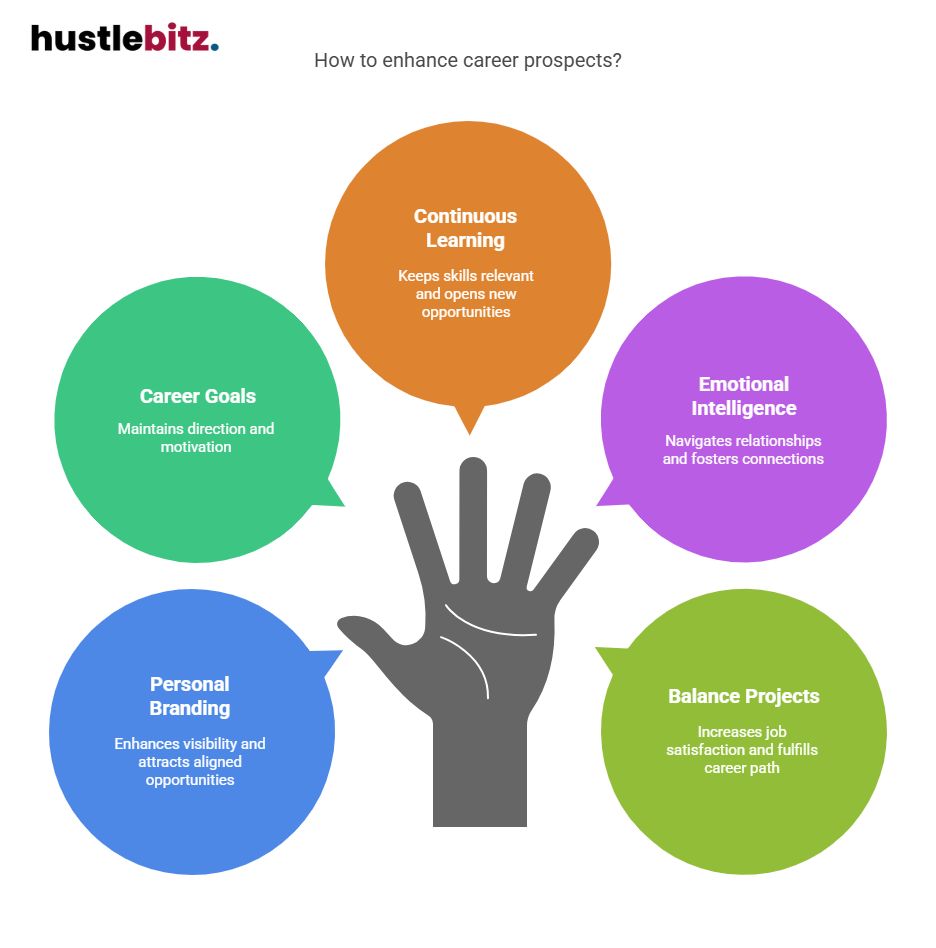Millennials can effectively navigate the workforce by cultivating skills like adaptability, emotional intelligence, and personal branding. Overcoming stereotypes involves demonstrating a strong work ethic and resilience. Embracing leadership qualities enhances team dynamics and fosters collaboration. As the gig economy grows, pursuing freelance opportunities aligns passions with income stability. Establishing clear career goals provides direction, while prioritizing work-life balance reduces stress and increases job satisfaction. Building a robust personal brand enhances visibility and attracts aligned opportunities. Each of these elements contributes to a fulfilling career, and there is much more to explore about thriving in this dynamic landscape.
Key Takeaways
- Develop a strong personal brand to enhance visibility and attract aligned opportunities in a competitive job market.
- Set clear career goals and regularly review progress to maintain direction and motivation in your professional journey.
- Embrace continuous learning to stay relevant and open up new opportunities in an ever-evolving workforce.
- Cultivate emotional intelligence to navigate workplace relationships and foster genuine connections with colleagues.
- Balance passion projects with financial stability for increased job satisfaction and a fulfilling career path.

Overcoming Millennial Stereotypes
To effectively overcome the pervasive stereotypes associated with millennials, it is essential to demonstrate a strong work ethic, adaptability, and commitment to continuous learning in the workplace. Millennials often face stereotype challenges that paint them as entitled or unmotivated; however, millennial resilience is crucial in countering these misconceptions. By actively showcasing determination and a willingness to embrace new responsibilities, millennials can reshape workplace perceptions and highlight their value as dedicated professionals.
The generational impact of millennials in the workforce is significant, as they bring fresh perspectives and innovative ideas that can drive organizations forward. This identity evolution allows them to not only dispel negative stereotypes but also to contribute meaningfully to the workplace culture. By focusing on collaboration and harnessing technology, millennials can demonstrate their proficiency in navigating today’s fast-paced business environment.
Moreover, pursuing continuous learning opportunities—whether through formal education, professional development, or self-directed study—positions millennials as lifelong learners. This commitment not only enhances individual skill sets but also reflects a proactive approach that employers highly value.
Developing Leadership Qualities

Building on the foundation of overcoming stereotypes, developing leadership qualities is vital for millennials seeking to enhance their influence and effectiveness in the workplace. Effective leaders possess a blend of various leadership styles, adapting their approach to fit the needs of their teams and organizations. By cultivating emotional intelligence, millennials can better understand their own emotions and the feelings of others, fostering a more collaborative environment.
Mentorship opportunities play a crucial role in this developmental journey. Engaging with seasoned professionals can provide valuable insights into effective decision-making skills and strategies for successful team collaboration. These relationships not only inspire growth but can also instill a sense of accountability and purpose.
Consider the following aspects to cultivate leadership qualities:
- Embrace vulnerability as a strength, allowing for genuine connections.
- Seek feedback regularly to enhance self-awareness and adaptability.
- Encourage open communication within teams to build trust and collaboration.
- Foster a growth mindset, viewing challenges as opportunities for development.
- Lead by example, demonstrating integrity and resilience in every situation.
Thriving in Gig Economy
As the gig economy continues to reshape traditional employment landscapes, millennials must adopt adaptive strategies to not only survive but thrive in this evolving work environment. The rise of freelance opportunities presents a unique chance for millennials to leverage their skills in a flexible manner, allowing them to choose projects that align closely with their passions and career goals.
One crucial component of thriving in this environment is remote networking. Establishing connections with industry professionals through online platforms can significantly enhance visibility and open doors to new projects. Engaging in virtual communities can lead to collaborations, mentorship opportunities, and a broader understanding of market trends.
Additionally, skill diversification is paramount. As industries evolve, the demand for varied skill sets increases. By continuously learning and adapting, millennials can position themselves as versatile candidates, making them more attractive to potential clients and employers. This approach not only enhances employability but also fosters resilience in the face of changing market demands.
Personal branding plays a vital role in the gig economy. Crafting a strong personal brand that communicates expertise and value can set individuals apart in a crowded marketplace. Consistent online presence through social media, professional websites, and portfolios can effectively showcase accomplishments and attract suitable opportunities.
Cultivate Adaptability

Cultivating adaptability is essential for millennials navigating an ever-changing job market, where the ability to pivot in response to new challenges can significantly enhance career prospects.
In today’s dynamic work environment, emotional intelligence plays a crucial role in understanding and responding to shifting workplace dynamics. By developing this skill, millennials can better navigate interpersonal relationships, fostering collaboration and innovation.
Continuous learning is another vital aspect of adaptability. Embracing new knowledge and skills not only keeps professionals relevant but also opens doors to unexpected opportunities. Coupled with effective networking strategies, millennials can forge connections that lead to mentorship and career advancement.
Additionally, resilience building is key. The ability to recover from setbacks and maintain a positive outlook is invaluable in a landscape characterized by rapid change. This resilience is enhanced through feedback incorporation, where constructive criticism is viewed as a chance for growth rather than a setback.
Consider the following emotional motivators for cultivating adaptability:
- Embrace change as a pathway to growth
- Transform challenges into opportunities
- Foster connections that inspire collaboration
- Harness feedback to propel personal development
- Celebrate resilience as a testament to your strength
Prioritize Work-Life Balance

How can millennials effectively prioritize work-life balance in an increasingly demanding professional landscape? The integration of work and personal life has become more fluid, particularly with the rise of remote work. To navigate this shift, millennials must establish clear personal boundaries while embracing flexible schedules that allow for both productivity and personal time.
Creating a structured approach to work-life balance can significantly enhance mental health and overall well-being. Below is a simple framework to guide this process:
| Strategies | Benefits |
| Establish Personal Boundaries | Reduces stress and burnout |
| Embrace Flexible Schedules | Increases job satisfaction and productivity |
| Implement Digital Detox | Enhances focus and mental clarity |
Establishing personal boundaries is fundamental; it is vital to communicate your availability to colleagues and avoid overcommitting. Flexible schedules can empower millennials to work during their most productive hours while allowing time for personal commitments.
Moreover, a regular digital detox—stepping away from screens and social media—can rejuvenate the mind, fostering creativity and reducing anxiety. By intentionally allocating time for hobbies, exercise, and relationships outside of work, millennials can create a more fulfilling life.
Balancing Passion with Stability

Navigating the complexities of career choices often requires millennials to find a harmonious balance between pursuing their passions and ensuring financial stability. In an era where job satisfaction is paramount, many young professionals grapple with the desire to engage in passion projects while also seeking financial security. The challenge lies in recognizing that both elements can coexist, leading to a fulfilling and sustainable career.
To achieve this balance, millennials should consider the following:
- The joy of waking up excited about work
- The fear of being trapped in unfulfilling roles
- The thrill of exploring new creative avenues
- The anxiety of financial uncertainty
- The satisfaction of personal growth and achievement
Finding career flexibility allows millennials to incorporate passion projects into their lives without sacrificing stability. For instance, pursuing side gigs or freelance opportunities can offer both creative fulfillment and additional income. This approach not only fosters personal growth but also enhances job satisfaction, as individuals feel more engaged and invested in their work.
Ultimately, striking the right balance between passion and stability is a personal journey. It requires introspection, a willingness to adapt, and the courage to take calculated risks. By embracing both their passions and the need for financial security, millennials can forge a path that leads to a rewarding and enriched professional life.
Set Clear Career Goals

Establishing clear career goals is essential for millennials seeking direction and purpose in their professional journeys. By implementing effective goal-setting strategies, individuals can create a framework that not only outlines their aspirations but also provides a roadmap for achieving them. This process begins with defining a long-term vision that aligns with personal values and desired career outcomes.
Career mapping is a valuable tool in this endeavor, allowing millennials to visualize their career trajectory and identify the necessary steps to reach their goals. This involves breaking down larger objectives into manageable milestones, facilitating milestone tracking that measures progress and keeps motivation high. Regularly reviewing these milestones ensures that individuals stay on course and make adjustments as needed.
Additionally, personal branding plays a crucial role in achieving career goals. By cultivating a strong professional identity and showcasing skills and accomplishments, millennials can enhance their visibility in a competitive job market. This not only aids in networking but also attracts opportunities that align with their career aspirations.
Ultimately, setting clear career goals empowers millennials to navigate the complexities of the workforce with confidence and purpose. By combining strategic goal setting, comprehensive career mapping, and effective personal branding, individuals can create a clear path toward fulfilling their professional ambitions. As they progress, the clarity gained from these objectives can lead to greater job satisfaction and career advancement.
Final Thoughts
Navigating the workforce as a millennial requires a blend of adaptability, emotional intelligence, and strategic goal-setting. By overcoming stereotypes, developing leadership qualities, and embracing the gig economy, millennials can thrive in an ever-changing professional landscape. Maintaining work-life balance and blending passion with financial stability are crucial for long-term career satisfaction. By setting clear goals and cultivating a personal brand, millennials can confidently shape their career paths. Ultimately, the key to success lies in continuous learning, resilience, and embracing opportunities that align with both personal values and professional growth.




